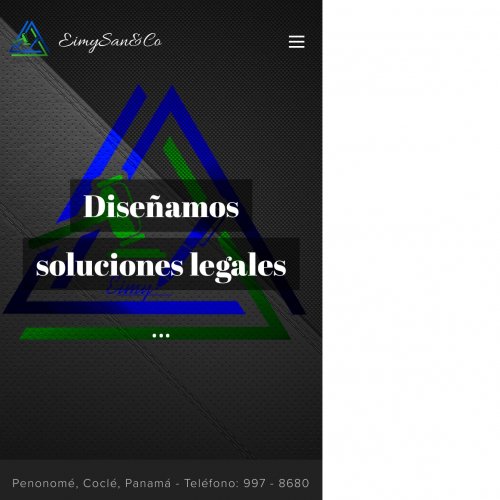Best Nonprofit & Charitable Organizations Lawyers in Penonomé
Share your needs with us, get contacted by law firms.
Free. Takes 2 min.
List of the best lawyers in Penonomé, Panama
About Nonprofit & Charitable Organizations Law in Penonomé, Panama
Nonprofit and charitable organizations in Penonomé, Panama, operate within a framework designed to support civil society's role in addressing social, environmental, and cultural issues. The legal landscape ensures that such organizations can function effectively while maintaining transparency and accountability. These organizations are often established to provide educational, environmental, or social services, and they must adhere to specific legal standards to ensure ethical operations and eligibility for certain tax exemptions.
Why You May Need a Lawyer
Engaging a lawyer can be crucial for several reasons when dealing with nonprofit and charitable organizations in Penonomé. Common situations include:
- Establishing a new nonprofit organization, which involves navigating complex registration procedures.
- Ensuring compliance with local and international regulations, including financial and tax obligations.
- Drafting and reviewing contracts and agreements involving partnerships or donations.
- Handling internal governance disputes or issues related to board responsibilities.
- Guidance on fundraising activities and ensuring lawful solicitation of donations.
Local Laws Overview
The primary legal framework governing nonprofit and charitable organizations in Penonomé includes regulations related to incorporation, tax exemptions, and operational guidelines:
- Regulations on incorporation define the process for legal establishment, requiring specific documentation and adherence to organizational bylaws.
- Tax laws provide criteria for tax-exempt status, which organizations must meet to benefit from financial advantages.
- There are robust laws ensuring transparency in financial reporting to prevent misuse of funds.
- Fundraising laws regulate how organizations can solicit donations, emphasizing donor rights and ethical practices.
Frequently Asked Questions
What are the first steps to register a nonprofit in Penonomé?
The initial steps involve drafting articles of incorporation and bylaws, followed by registration with the appropriate municipal authorities.
Can a foreign entity establish a nonprofit in Penonomé?
Yes, but the entity must comply with national regulations and may need legal representation to navigate the specific requirements.
What benefits do tax-exempt nonprofits receive?
They are often exempt from income taxes and may receive additional benefits such as reduced rates for certain services or properties.
How often must a nonprofit report its financial status?
Nonprofits must typically report annually, detailing financial activities and ensuring transparency for accountability.
Are there restrictions on how a nonprofit can use donations?
Yes, donations must be used in accordance with the donor's intent and the organization’s stated mission.
What is needed for a nonprofit to engage in international fundraising?
Engaging in international fundraising may require adherence to additional regulations both domestically and abroad, including compliance with foreign financial transaction laws.
Can a nonprofit pay its board members or officers?
This depends on the organization’s bylaws and any applicable legal restrictions; nonprofit officers are usually unpaid or compensated minimally.
How do nonprofit organizations influence local lawmaking?
They can influence by participating in advocacy and community engagement activities, often collaborating with local government on social initiatives.
Are nonprofits allowed to participate in political activities?
Generally, nonprofits can advocate for issues but must avoid endorsing political candidates to retain their tax-exempt status.
What happens if a nonprofit fails to comply with regulatory requirements?
Noncompliance can lead to penalties including fines, loss of tax-exempt status, or dissolution of the organization.
Additional Resources
For those seeking further assistance, several resources are available:
- Municipality of Penonomé: The local government office can provide guidelines on registration and compliance.
- Panama's Ministry of Economy and Finance: Offers details on tax regulations affecting nonprofits.
- Local Legal Aid Groups: These organizations often provide pro bono services or affordable legal advice to nonprofits.
- Foundations and Professional Associations: Joining a network of similar organizations can provide shared knowledge and resources.
Next Steps
If you need legal assistance for your nonprofit or charitable organization, consider taking the following steps:
- Contact a local attorney specializing in nonprofit law to discuss your specific needs and circumstances.
- Prepare all relevant documentation, such as bylaws, articles of incorporation, and financial records.
- Schedule a consultation to explore your legal questions and understand your organization's rights and obligations.
- Attend workshops or informational sessions offered by local governmental bodies or nonprofit associations to stay informed about changes in the law.
Lawzana helps you find the best lawyers and law firms in Penonomé through a curated and pre-screened list of qualified legal professionals. Our platform offers rankings and detailed profiles of attorneys and law firms, allowing you to compare based on practice areas, including Nonprofit & Charitable Organizations, experience, and client feedback.
Each profile includes a description of the firm's areas of practice, client reviews, team members and partners, year of establishment, spoken languages, office locations, contact information, social media presence, and any published articles or resources. Most firms on our platform speak English and are experienced in both local and international legal matters.
Get a quote from top-rated law firms in Penonomé, Panama — quickly, securely, and without unnecessary hassle.
Disclaimer:
The information provided on this page is for general informational purposes only and does not constitute legal advice. While we strive to ensure the accuracy and relevance of the content, legal information may change over time, and interpretations of the law can vary. You should always consult with a qualified legal professional for advice specific to your situation.
We disclaim all liability for actions taken or not taken based on the content of this page. If you believe any information is incorrect or outdated, please contact us, and we will review and update it where appropriate.








